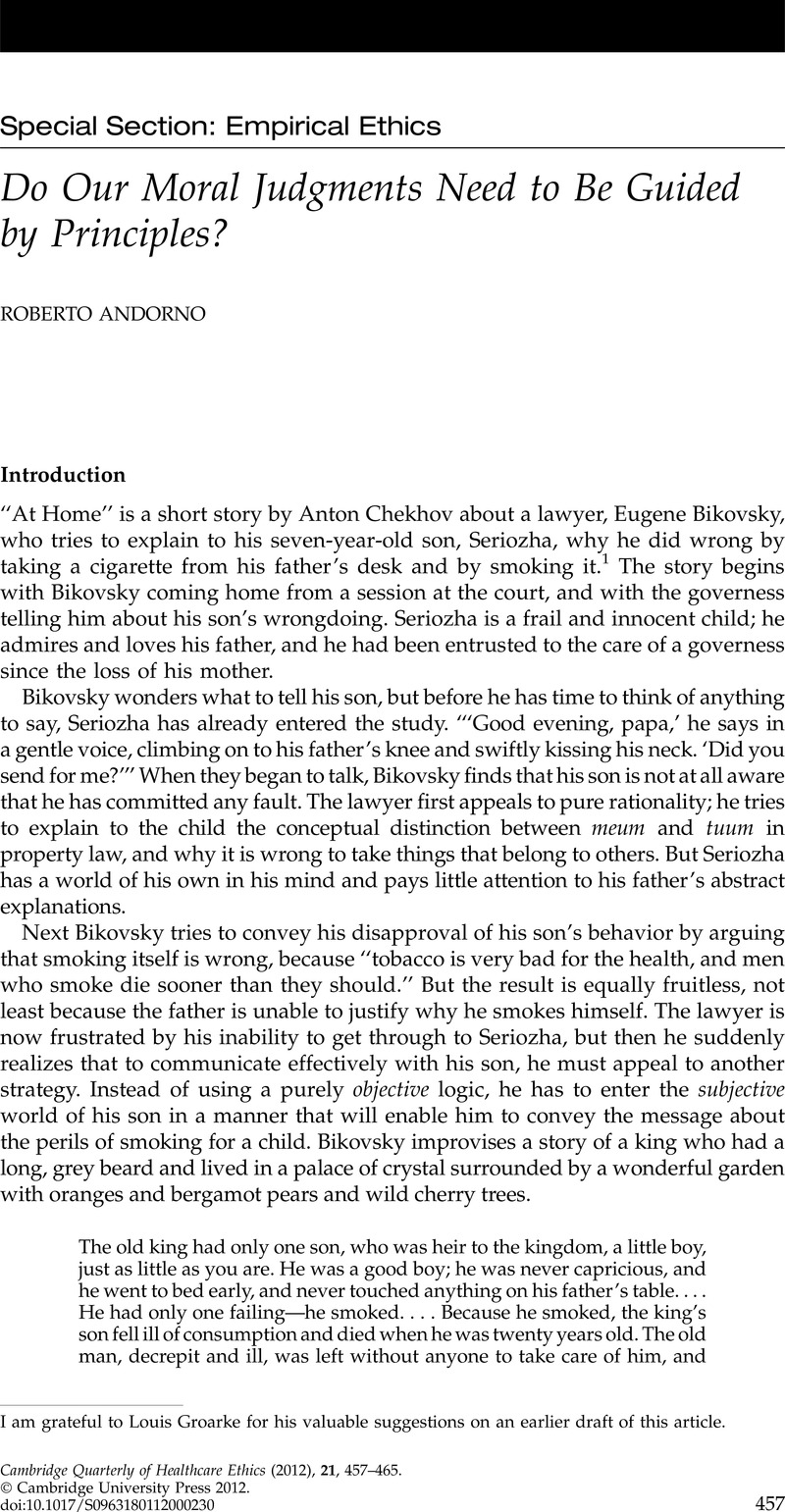Published online by Cambridge University Press: 24 July 2012

1. Chekhov, A.Selected Stories. Hertfordshire: Wordsworth; 1996:16–24.Google Scholar
2. Musschenga, A.Empirical ethics, context-sensitivity and contextualism. Journal of Medicine and Philosophy 2005;30(5):467–90.CrossRefGoogle ScholarPubMed
3. See Beauchamp, TL, Childress, JF. Principles of Biomedical Ethics. 3rd ed.New York: Oxford University Press; 1989.Google Scholar In later editions of this work, the authors have made significant efforts to incorporate the criticisms to their principlist approach.
4. Pellegrino, E.The metamorphosis of medical ethics: A 30 years perspective. JAMA 1993;269:1158–62.CrossRefGoogle Scholar See also, among many others, Clouser, KD, Gert, B.A critique of principlism. Journal of Medicine and Philosophy 1990;15:219–36CrossRefGoogle ScholarPubMed; ten Have, H.The hyperreality of clinical ethics: A unitary theory and hermeneutics. Theoretical Medicine 1994;15:113–31.CrossRefGoogle ScholarPubMed
5. See Andorno, R. Anti-theory. In: Chadwick, R, ten Have, H, Meslin, E, eds. Sage Handbook of Health Care Ethics. London: Sage; 2011:31–8.Google Scholar
6. Anscombe, E.Modern moral philosophy. Philosophy 1958;33:1–19. Reprinted in: Crisp R, Slote M, eds. Virtue Ethics. Oxford: Oxford University Press; 1997:26–44.CrossRefGoogle Scholar
7. Stocker, M.The schizophrenia of modern ethical theory. Journal of Philosophy 1976;73(14):453–66. Reprinted in Crisp R, Slote M, eds. Virtue Ethics. Oxford: Oxford University Press; 1997:66–78.CrossRefGoogle Scholar
8. MacIntyre, A.After Virtue: A Study in Moral Theory. 2nd ed.Notre Dame, IN: University of Notre Dame Press; 1984, at 54–5.Google Scholar
9. Beiner, R. Do we need a philosophical ethics? In: Bartlett, R, Collins, S, eds. Action and Contemplation: Studies in the Moral and Philosophical Thought of Aristotle. New York: State University of New York Press; 1999:37–52, at 43.Google Scholar
10. See Nussbaum, M. Bernard, Williams: Tragedies, hope, justice. In: Calcut, D, ed. Reading Bernard Williams. New York: Routledge; 2009, at 213.Google Scholar
11. Williams, B.Ethics and the Limits of Philosophy. London: Fontana Press; 1985.Google Scholar
12. See note 11, Williams 1985, at 72.
13. See note 11, Williams 1985, at 78–92.
14. Jonsen, A, Toulmin, S.The Abuse of Casuistry: A History of Moral Reasoning. Berkeley: University of California Press; 1988.Google Scholar
15. See Dworkin, G. Theory and practice of moral reasoning. In: Copp, D, ed. The Oxford Handbook of Ethical Theory. New York: Oxford University Press; 2006:624–44.Google Scholar
16. Dancy, J.Ethics Without Principles. New York: Oxford University Press; 2004.CrossRefGoogle Scholar
17. Gauch, H.Scientific Method in Practice. Cambridge: Cambridge University Press; 2004, at 221.Google Scholar
18. Aristotle, Posterior Analytics (transl. by ES Forster and H Tredennick). Loeb Classical Library. Cambridge, MA: Harvard University Press; 1960:II.19.
19. See Welch, J. Cleansing the doors of perception: Aristotle on induction. In: Boudouris, K, ed. Greek Philosophy and Epistemology. Vol. II. Athens: International Association for Greek Philosophy; 2001:204–13.Google Scholar
20. Aristotle, Nicomachean Ethics (transl. by H Rackham). Loeb Classical Library. Cambridge, MA: Harvard University Press; 1982:VI.3.3.
21. Aristotle, On the Soul (transl. by WS Hett). Loeb Classical Library. Cambridge, MA: Harvard University Press; 1975:III,8,432a.
22. The axiom “nihil est in intellectu . . .” can be literally found in Thomas Aquinas’s writings. See, e.g., Quaestiones disputatae De veritate. In Opera Omnia (Leonine edition), Vol. 22. Rome: Editori di San Tommaso;l976: q. 2, a. 3, arg. 19.
23. Locke, J, An Essay Concerning Human Understanding. Book II. New York: Prometheus Books; 1995.Google Scholar
24. Smith, R. Aristotle’s logic. In: Zalta, EN, ed. The Stanford Encyclopedia of Philosophy. 2009 Spring; available at http://plato.stanford.edu/entries/aristotle-logic (last accessed 14 Dec 2010).Google Scholar
25. Groarke, L.An Aristotelian Account of Induction: Creating Something from Nothing. Montreal: McGill-Queen’s University Press; 2009, at 331.Google Scholar
26. MacIntyre, A. First principles, final ends and contemporary philosophical issues. In: Knight, K, ed. The MacIntyre Reader. Notre Dame, IN: University of Notre Dame Press; 1998, at 171.Google Scholar
27. Hare, RM.The Language of Morals. Oxford: Oxford University Press; 1961, at 39.Google Scholar
28. See note 9, Beiner 1999, at 43.
29. See Beauchamp, T. Universal principles and universal rights. In: den Exter, A, ed. Biomedicine and Human Rights. Antwerpen: Makku; 2010:49–66. Beauchamp T. A defense of the common morality. Kennedy Institute of Ethics Journal 2003;13(3):259–74.Google Scholar
30. See note 20, Aristotle, VI.13.5
31. See note 26, MacIntyre 1998, at 189.
32. See note 20, Aristotle, I.3.4.
33. Louden, R. Morality and Moral Theory: A Reappraisal and Reaffirmation. New York: Oxford University Press; 1992, at 139.CrossRefGoogle Scholar
34. See, for instance, Widdershoven, G, Abma, T. Hermeneutic ethics between practice and theory. In: Ashcroft, R, Dawson, A, Draper, H, eds. Principles of Health Care Ethics. Chichester: Wiley; 2007:215–21Google Scholar; Steinkamp, N, Gordijn, B.Ethical case deliberation on the ward: A comparison of four methods. Medicine, Health Care and Philosophy 2003;6(3):235–46CrossRefGoogle ScholarPubMed; Molewijk, B, van Zadelhoff, E, Lendemeijer, B, Widdershoven, G.Implementing moral case deliberation in Dutch health care; improving moral competency of professionals and the quality of care. Bioethica Forum. Swiss Journal of Biomedical Ethics 2008;1(1):57–65.Google Scholar
35. Saunders, B.How to teach moral theories in applied ethics. Journal of Medical Ethics 2010(10);36:635–8.CrossRefGoogle ScholarPubMed
36. Maxwell, B, Racine, E.Should empathic development be a priority in biomedical ethics teaching? A critical perspective. Cambridge Quarterly of Healthcare Ethics 2010;19(4):433–45.CrossRefGoogle ScholarPubMed